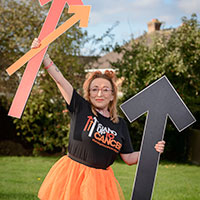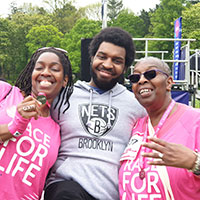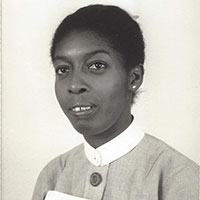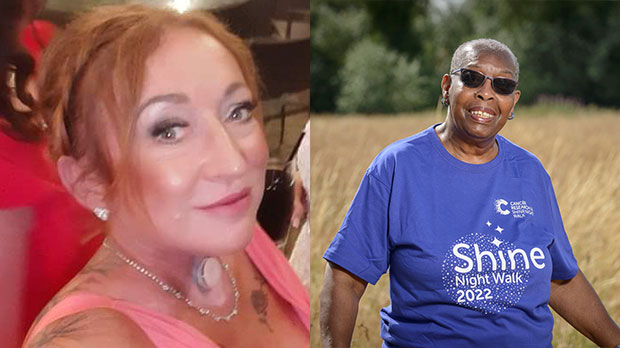Loren (left) and Dinny (right), who both lost their voices during their cancer treatment
Human beings face many of their worst demons by expressing their emotions and sharing their experiences with others. For most patients, speaking out about a cancer diagnosis and voicing worries, fears, highs and lows, is an important way of dealing with the experience.
We use our voices to communicate pain, fear, hope, love, joy; it is our way of reaching out to other people and giving and receiving support, comfort and validation.
So what happens when cancer takes away your ability to speak, robbing you of the fundamental communication we all take for granted?
Both Dinny and Loren suffered that exact fate. They had different types of cancer, but in both cases, the disease and its treatment took away their voices.
Until, of course, they found a way to break the silence.
Loren’s story
 Dental nurse Loren, 48, from Shropshire can now speak jokingly about the voice prosthesis that makes her sound ‘like Marge Simpson’.
Dental nurse Loren, 48, from Shropshire can now speak jokingly about the voice prosthesis that makes her sound ‘like Marge Simpson’.
But there was a time when Loren, robbed of her voicebox by cancer, was so despairing she wrote notes on bits of paper begging doctors to let her die.
Loren was left mute for weeks and unable to eat solid food for a year after a tumour grew from her salivary glands and wrapped itself round the nerves and structures in her neck.
She was diagnosed with adenoid cystic carcinoma in April 2019 after months of breathlessness, headaches, earache, and a feeling that something was stuck in her throat.
She said: “The tumour had grown downwards from my salivary gland and was protruding into my airway. It had grown slowly for years, taking over my whole neck.”
Loren had a ten-hour operation during which the tumour, her larynx, thyroid, saliva glands and part of her oesophagus were removed, and her stomach was pulled up.
Fighting back from rock bottom
After surgery, the first thing she did was take a selfie, to reassure her autistic son that she was alright. But two days later reality kicked in and Loren hit rock bottom, writing on bits of paper to ask the doctors to withdraw her feeding tube and let her die.
“The cancer nurse sat by my side all day on that terrible day. But the next morning I realised I had to put my ‘big girl pants’ on and get on with life, because I had to live for my son. So, I learned to manage my own feeding tube and medications, and determined to embrace my new way of living.”
Loren lost three stone in weight on her liquid diet. After a second operation to make the tracheosophageal voice prosthesis (TEP), she had seven weeks of intensive radiotherapy to her neck.
She had to learn to speak using the TEP, which is permanently sited in her throat. She presses a valve to control the airflow, and this enables her to speak.
“People are sometimes freaked out by the voice. It is a rough, rasping sound – I call it my ‘Marge Simpson’ voice. Some people stare at the valve in my throat, talking instead to my friends as if I am invisible.”
“I wouldn’t go out of the house at first, but now I don’t let anything hold me back: I’ve learned to eat again, I work, I socialise and exercise at the gym. I even gave a speech at my friend’s wedding!”
Despite a routine scan in October 2020 showing that Loren’s cancer had come back in her lungs and is now inoperable, she is determined to live life as normally as possible and do her utmost to share her experience.
“I just need people to know that there is life after a laryngectomy. It takes time, but you will get there. It’s so important to have a voice and use it, no matter how your voice sounds”.
Dinny’s story

Dinny with her children Allison and Adrian at Race for Life in 2019
Dinny Hinds loves to sing. Whether that’s in church, at home, around the shops – her voice has always brought joy to those around her. So when she was told not to even speak after surgery to remove her thyroid gland, she admits she struggled.
The 75-year-old mum of two was still working as a nurse at the time so the thought of losing her voice was especially difficult.
“I remember asking the doctor how long I’d got left because it felt like a death sentence,” said Dinny who was diagnosed with thyroid cancer in 2005 after finding a lump in her neck. “I was shocked beyond belief, but they told me I would survive. The next shock was being told that I might need to have a tracheostomy and speak through a tube.
“I love to sing so I was very scared and, even though I didn’t need a tube fitted, I was told not to speak to people for quite a long time after surgery as the operation had paralysed my vocal chord. That was very difficult for me.”
Dinny, who had already had a cancerous lump cut from her tongue two years earlier, needed further surgery after the life-saving operation paralysed her left vocal cord.

Dinny as a newly qualified nurse
“I had to have a balloon inserted into my left vocal cord to help me speak.” said Dinny. “After that I had speech therapy, but I had to retire from nursing because they said I would be unable to shout for help on the wards.
“That was hard, but I was very glad to be alive and I was determined to keep talking and singing. Now I spend a lot of time telling people how important it is to check themselves carefully and visit the doctor if they spot anything unusual. If I hadn’t noticed a lump while putting face cream on after my night shift, I might not be here today. I remain very thankful to all the doctors, nurses and scientists whose work saved my life.
“My voice isn’t quite the same because it’s quite gravelly now, but I still sing around the house all the time and I love to sing in church. In fact, I sing like a bird now.”
Jane and Paula
